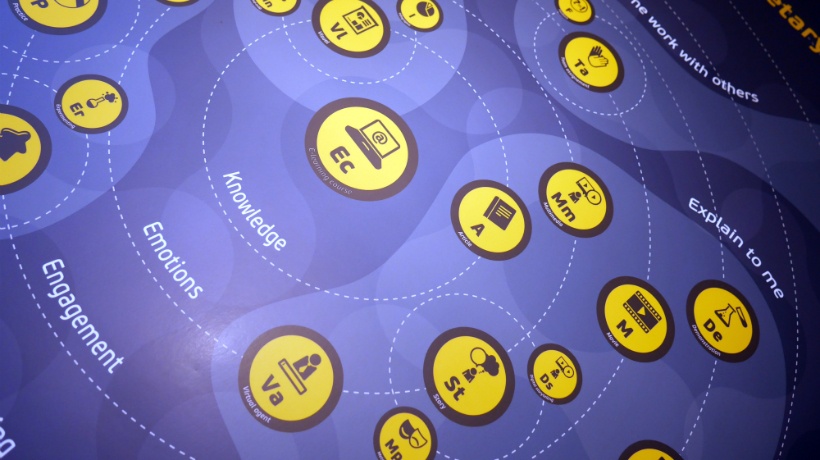eLearning Course Design: 13 Critical Points To Consider
It is not possible to provide a recipe for excellent eLearning course design, as every single course should respond to specific objectives and meet specific requirements and needs. There are, however, some areas which need to be taken into consideration while designing an eLearning solution, and Instructional Designers should take deliberate decisions regarding every single one of them. Here is the list of questions which I try to ask myself when designing an eLearning course:
- How to transfer knowledge?
Knowledge transfer used to be considered as the most important element of an eLearning course. Should we use text forms? Visual forms? If visual; what kind would be the most appropriate? - How to build emotions?
It is hard to influence eLearners without building any emotions. Maybe stories will be the best choice? Maybe emotional pictures or other multimedia will build "aha" moments? Maybe a suggestive metaphor will anchor the critical message? - How to engage eLearners?
You know Dale's Pyramid... These numbers are useless, but one must admit that engagement drives learning results. Will we build engagement by offering simple exercises? Or by using more sophisticated methods, like virtual worlds or games? Will we introduce some tasks to be done outside of the screen? Will we design these tasks to be done individually or with peers? - How to build sustainable understanding of the subject matter?
The forgetting curve is unstoppable. But we can try to make it decline slower, e.g. with deeper understanding of the subject matter by the eLearners. How will we demonstrate and explain an idea? How will we let room for reflective observation? How will we repeat the most important messages to reinforce learning objectives? - How to implement new skills on the job?
Training without implementation of new skills on the job is like reading a book and skipping the last 20 pages. How will we show how to do things right? How will we support eLearners in their tasks? How will we provide feedback when their performance is not so good? - How to assess these skills?
An eLearning course is usually a part of a formal training process - results are transferred to the Learning Management System for training administration purposes. Will the final test be the only assessment point in the eLearning course? How will we analyze the results and what will we do with them? - How to let eLearners to continue their learning journey?
A great eLearning course should be only the preludium of a learning journey. Do we have any ideas about how to motivate eLearners to continue it? Maybe we could facilitate additional, remote learning activities. Maybe we could open a shared knowledge space for all participants. Maybe, after the eLearning course is over, we could launch a remote peer-to-peer learning environment which will keep learners engaged. - How to support learners' performance?
If eLearners are left alone during and after the eLearning intervention, there is a risk that results will be poor. Do we have an idea about how to support their job with all of these new skills? Do we want to provide them with performance support tools? Or maybe let them contact with a Subject Matter Expert if they have any doubts or problems? - How to make eLearners make their own experiments with the subject matter?
According to Kolb's Cycle, experimenting is an important part of learning. How will we let people learn by experience? How will we penalize their mistakes? How will we let them practice new skills in a safe and comfortable environment? - How to let eLearners explore a new intellectual area?
Self-exploration is very important while learning: It lets focus on personal goals, interests, and competency gaps, while skipping unimportant parts from a personal point of view. What approach will we employ to build this sense of personalization and freedom? How will we create a learning environment which eLearners want to explore? - How to engage eLearners in a subject-related and goal-oriented social interaction?
People are social animals and learning is a social process. How will we introduce the social factor to the eLearning course? What kind of tools, approaches, and solutions will we propose to build an objectives-oriented relationship between people in the learning process? - How to explain subject matter nuances?
While building new skills, everything should be clear; eLearners should feel end-to-end competency (defined as an learning objective) on a given level. As Instructional Designers, we should ask ourselves these questions: What to do to make all messages clear, having in mind that the eLearning course will be used by people on various levels? How to add messages for more advanced learners? Is it necessary to introduce human support and, if so, how to do it? - How to motivate and recognize the efforts of an eLearner?
The eLearning completion rates are low, so it is necessary to constantly motivate and recognize the learners' efforts. What kind of feedback will we provide after exercises? Will it be not only explaining and supporting, but also motivating? Will we recognize achievements only by offering short congratulations after passing the final test, or will we offer the option to print the certificate? Maybe even employ an additional recognition, which is far away from a simple technical activity which is pre-programmed in the eLearning course or the Learning Management System?
eLearning Course Planetary System
All of these inspirations are covered by the LBC Map (Learning Battle Cards Map) dedicated to eLearning courses. You can download a free version based on Creative Commons licence here. You can also order a heavy duty poster-size map (39 x 29 inches or 100 x 70 cm) to hang on your wall and have it right in front of you. You can even order it with one or two decks of Learning Battle Cards in the store on our website.
Between the 15th of June and the 15th of July we are celebrating a new book about Learning Battle Cards! That is why you can save 30% of the price using our store coupon: LBCBOOK.








